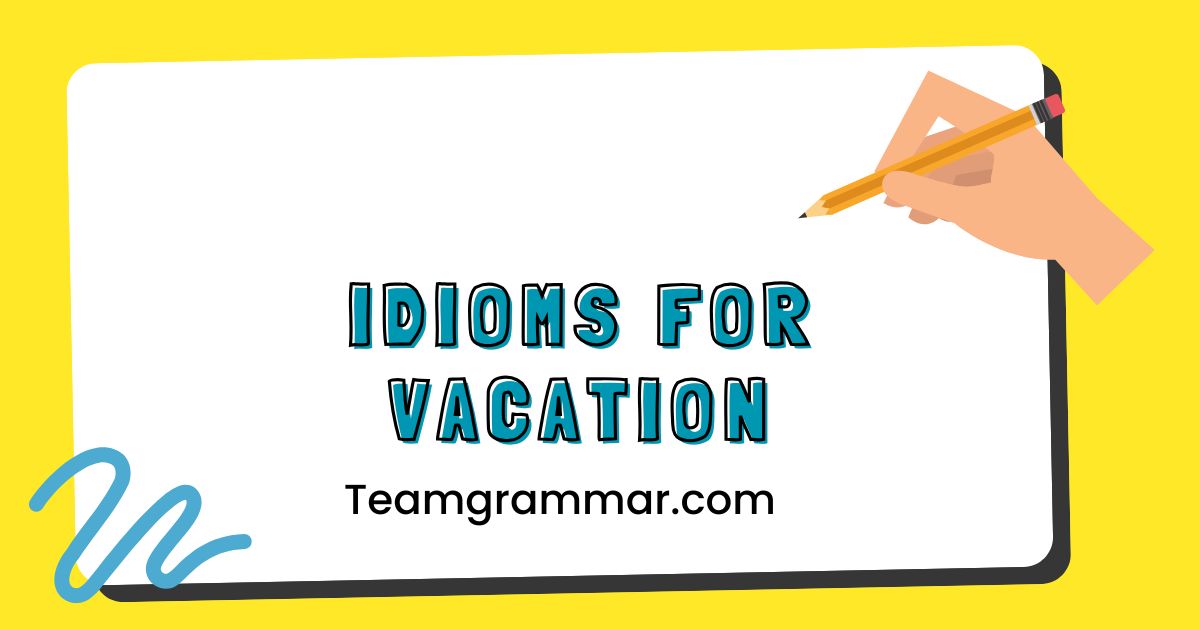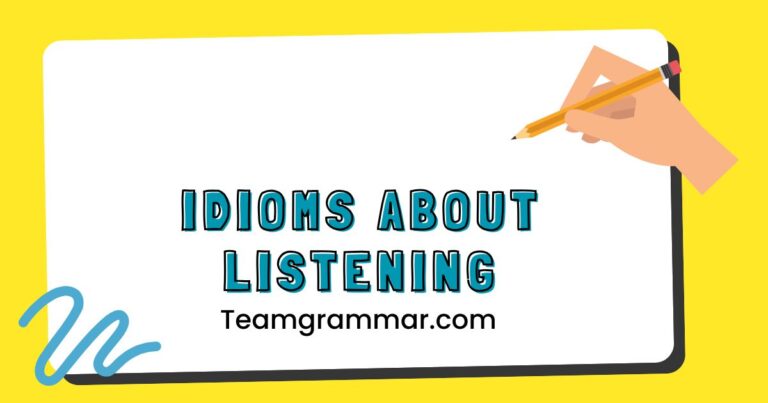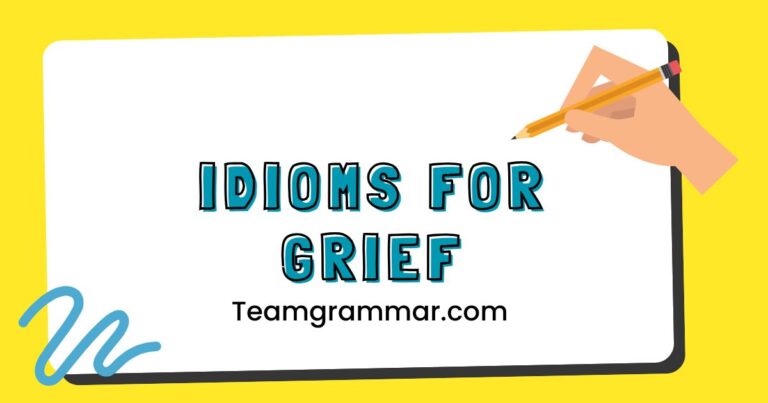41 Vacation Idioms: Master English Expressions for Travel
Understanding idioms is crucial for mastering English, especially when discussing travel and vacations. Idioms add color and nuance to our language, making our conversations more engaging and natural.
This article explores common idioms related to vacations, helping you understand and use them correctly. Whether you are a student, traveler, or language enthusiast, this guide will enhance your grasp of English idioms and improve your communication skills.
Table of Contents
- Introduction
- Definition of Idioms
- Structural Breakdown of Idioms
- Types and Categories of Vacation Idioms
- Examples of Vacation Idioms
- Usage Rules for Vacation Idioms
- Common Mistakes with Vacation Idioms
- Practice Exercises
- Advanced Topics in Vacation Idioms
- FAQ: Common Questions About Vacation Idioms
- Conclusion
Definition of Idioms
An idiom is a phrase or expression whose meaning cannot be understood from the literal meanings of its individual words. Instead, idioms carry a figurative or symbolic meaning that is culturally specific.
Understanding idioms is essential for comprehending spoken and written English, as they are frequently used in everyday conversations, literature, and media. Idioms often reflect the history, culture, and values of a language.
Classification of Idioms
Idioms can be classified based on their structure, origin, or the type of figurative meaning they convey. Some idioms are metaphorical, using imagery to represent abstract concepts.
Others are based on historical events, folklore, or common experiences. Classifying idioms helps learners understand their nuances and remember their meanings more effectively.
Function of Idioms
Idioms serve several functions in communication. They add color and expressiveness to language, making it more engaging and memorable.
They can also convey complex ideas or emotions in a concise and impactful way. Furthermore, using idioms correctly can demonstrate a deeper understanding of the language and culture.
Contexts for Using Idioms
Idioms are used in a wide range of contexts, from informal conversations to formal presentations. However, it’s important to be mindful of the audience and the situation when using idioms.
Some idioms may be more appropriate for casual settings, while others are suitable for more formal contexts. Understanding the context is crucial for using idioms effectively and avoiding misunderstandings.
Structural Breakdown of Idioms
Idioms often consist of fixed expressions with specific grammatical structures. Understanding these structures can help learners recognize and interpret idioms more easily.
Idioms can include various parts of speech, such as verbs, nouns, adjectives, and prepositions. The arrangement and combination of these elements contribute to the unique meaning of the idiom.
Common Idiomatic Patterns
Some common idiomatic patterns include verb + preposition combinations (e.g.,look forward to), noun phrases (e.g.,a piece of cake), and fixed phrases (e.g.,raining cats and dogs). Recognizing these patterns can help learners identify new idioms and understand their meanings more intuitively.
It’s also important to note that the grammatical rules that apply to regular phrases might not apply to idioms.
Structural Rules of Idioms
The structural rules of idioms are often inflexible, meaning that the words cannot be changed or rearranged without altering the meaning or making the idiom nonsensical. For example, the idiom”hit the road”cannot be changed to”strike the road”without losing its intended meaning.
This fixed nature is a key characteristic of idioms.
Types and Categories of Vacation Idioms
Vacation idioms can be categorized based on various themes, such as planning, travel, relaxation, and activities. Each category includes idioms that reflect specific aspects of the vacation experience.
Understanding these categories can help learners use idioms more appropriately and effectively.
Idioms Related to Planning
These idioms refer to the preparation and organization involved in planning a vacation. They often involve making decisions, setting goals, and dealing with logistics.
Examples include “get the ball rolling” (to start something) and “iron out the details” (to resolve minor issues).
Idioms Related to Travel
These idioms describe the journey and transportation aspects of a vacation. They often involve modes of transport, routes, and experiences encountered while traveling.
Examples include “hit the road” (to start a journey) and “off the beaten path” (to go to a place that is not well-known).
Idioms Related to Relaxation
These idioms focus on the leisure and rest associated with vacations. They often involve activities that promote relaxation, such as sunbathing, reading, and exploring new places.
Examples include “recharge your batteries” (to rest and regain energy) and “take it easy” (to relax).
Idioms Related to Activities
These idioms describe the various activities people engage in during their vacations, such as sightseeing, hiking, and trying new foods. Examples include “go sightseeing” (to visit famous places) and “try something new” (to experience something different).
Examples of Vacation Idioms
Here are several examples of vacation idioms, organized into tables for clarity. Each table focuses on a specific category, providing definitions and example sentences to illustrate their usage.
Planning Idioms
The following table provides idioms related to planning a vacation, along with their meanings and example sentences.
| Idiom | Meaning | Example Sentence |
|---|---|---|
| Get the ball rolling | To start something | Let’s get the ball rolling on our vacation plans by booking the flights. |
| Iron out the details | To resolve minor issues | We need to iron out the details of the itinerary before we leave. |
| In the pipeline | Being planned or developed | Our vacation to Italy is in the pipeline; we’re hoping to go next summer. |
| Put something on hold | To delay something | We had to put our vacation on hold because of work commitments. |
| Pencil something in | To make a tentative appointment | Let’s pencil in a meeting next week to discuss the vacation budget. |
| Call the shots | To make the decisions | Since it’s your vacation, you get to call the shots on where we go. |
| Map something out | To plan in detail | We need to map out our route before we start the road trip. |
| Set the stage | To prepare for something | Booking the hotel early set the stage for a stress-free vacation. |
| Get your ducks in a row | To organize things | Before leaving, make sure you get your ducks in a row by packing everything you need. |
| Ahead of the game | Well-prepared and organized | We’re ahead of the game with our vacation planning, having already booked our accommodations. |
| Jump the gun | To start something too early | I think we jumped the gun by booking the tours before confirming our dates. |
| Leave no stone unturned | To search thoroughly | We’ll leave no stone unturned in finding the perfect vacation rental. |
| Dot the i’s and cross the t’s | To pay attention to every detail | Make sure you dot the i’s and cross the t’s when filling out the travel insurance forms. |
| Cover all bases | To prepare for every possibility | We need to cover all bases by getting travel insurance and making backup plans. |
| Think outside the box | To be creative in planning | Let’s think outside the box and come up with unique vacation ideas. |
| Run something by someone | To get someone’s approval | I need to run the vacation itinerary by my boss before booking time off. |
| Lay the groundwork | To prepare the foundation | We need to lay the groundwork by researching the best travel deals. |
| Get down to brass tacks | To focus on the essential details | Let’s get down to brass tacks and finalize the budget for our vacation. |
| In the cards | Likely to happen | A relaxing beach vacation is in the cards for us this year. |
| Take the plunge | To make a big decision | We’re finally going to take the plunge and book that expensive cruise. |
| Crunch the numbers | To perform calculations | We need to crunch the numbers to make sure we can afford the trip. |
| Play it by ear | To decide things as they happen | We don’t have a strict itinerary; we’ll just play it by ear. |
| Get the lay of the land | To understand the area | Before making plans, let’s get the lay of the land. |
Travel Idioms
This table includes idioms related to the act of traveling, including transportation and the journey itself.
| Idiom | Meaning | Example Sentence |
|---|---|---|
| Hit the road | To start a journey | We’re going to hit the road early tomorrow morning to avoid traffic. |
| Off the beaten path | To go to a place that is not well-known | We want to explore destinations that are off the beaten path. |
| Travel light | To pack few things | I prefer to travel light and only bring the essentials. |
| Bite the bullet | To endure a difficult situation | We had to bite the bullet and pay extra for the last-minute flight. |
| Smooth sailing | Easy and without problems | After the initial delays, the rest of the trip was smooth sailing. |
| Ride shotgun | To sit in the front passenger seat | I always ride shotgun when we go on road trips. |
| In the driver’s seat | In control of a situation | As the trip planner, I’m in the driver’s seat for this vacation. |
| Lose steam | To lose energy or enthusiasm | After a few days of sightseeing, we started to lose steam. |
| Live out of a suitcase | To travel frequently and not stay in one place for long | The constant business trips made him feel like he was living out of a suitcase. |
| Round trip | A journey to a place and back again | We booked a round trip ticket to save money on our flights. |
| One-way ticket | A journey to a place without return | He bought a one-way ticket to start a new life in another country. |
| Full throttle | With maximum effort or speed | We went full throttle, trying to see as many sights as possible in a short amount of time. |
| Stay put | Remain in the same place | Because of the storm, we decided to stay put in our hotel room. |
| Get itchy feet | To have a strong desire to travel | After being home for too long, I started to get itchy feet. |
| Take a detour | To go a different or less direct route | We decided to take a detour to visit a small town we had heard about. |
| Travel on a shoestring | To travel with very little money | We travelled on a shoestring, staying in hostels and eating cheap food. |
| Keep your eyes peeled | To watch carefully for something | Keep your eyes peeled for interesting landmarks along the way. |
| Make good time | To travel quickly and efficiently | We made good time on the first leg of our journey. |
| Get your bearings | To become familiar with your surroundings | It took us a while to get our bearings in the new city. |
| Off the grid | In a remote location without technology | We went off the grid for a week to disconnect from the world. |
| At the crack of dawn | Very early in the morning | We left at the crack of dawn to catch our flight. |
| Backseat driver | Someone who gives unwanted advice to the driver | I hate it when my friend acts like a backseat driver. |
| Fly by the seat of your pants | To do something without planning | We decided to fly by the seat of our pants and see where the road takes us. |
| Take the scenic route | To travel along a more beautiful path | We decided to take the scenic route even though it was longer. |
Relaxation Idioms
The following table focuses on idioms related to relaxing and enjoying leisure time during a vacation.
| Idiom | Meaning | Example Sentence |
|---|---|---|
| Recharge your batteries | To rest and regain energy | I need to recharge my batteries after a busy work week. |
| Take it easy | To relax | Just take it easy and enjoy your vacation. |
| Kick back | To relax and do nothing | I plan to kick back on the beach and read a book. |
| Unwind | To relax and reduce stress | A hot bath helps me unwind after a long day. |
| Let your hair down | To relax and enjoy yourself | It’s time to let your hair down and have some fun on vacation. |
| Get away from it all | To escape from daily routines and stress | We wanted to get away from it all and find a peaceful retreat. |
| Take a load off | To relax and rest | Take a load off and let me get you something to drink. |
| Go with the flow | To accept things as they happen | Just go with the flow and enjoy whatever comes your way. |
| In the lap of luxury | In a very comfortable and luxurious environment | We spent our vacation in the lap of luxury at a five-star resort. |
| Put your feet up | To relax, especially by sitting with your feet supported | After a long day of hiking, I just want to put my feet up. |
| Take a breather | To take a short rest | Let’s take a breather before continuing our walk. |
| Relax and unwind | To become less tense or anxious | The spa is the perfect place to relax and unwind. |
| Chill out | To relax and calm down | Just chill out and enjoy the beautiful scenery. |
| Have a whale of a time | To have a very enjoyable time | We had a whale of a time at the beach party. |
| Soak up the sun | To enjoy the warmth of the sun | I want to soak up the sun and get a tan. |
| Bask in the glory | To enjoy praise or admiration | After winning the competition, she basked in the glory. |
| Take a chill pill | To calm down and relax | You need to take a chill pill and stop worrying so much. |
| Laze around | To do nothing and relax | I plan to laze around by the pool all day. |
| Take some time out | To take a break from work or other activities | We need to take some time out to spend with family. |
| Slow down | To reduce speed or pace | We need to slow down and enjoy the moment. |
| Hang loose | To relax and be carefree | Just hang loose and enjoy the vacation. |
| Be at ease | To feel relaxed and comfortable | I am at ease when I am surrounded by nature. |
| Get some shut-eye | To get some sleep | I need to get some shut-eye before the long drive. |
Activity Idioms
This table provides idioms related to various activities that people engage in during their vacations.
| Idiom | Meaning | Example Sentence |
|---|---|---|
| Go sightseeing | To visit famous places | We plan to go sightseeing and visit all the historical landmarks. |
| Try something new | To experience something different | I want to try something new on this vacation, like scuba diving. |
| Get a taste of | To experience something briefly | We want to get a taste of the local culture. |
| Take in the sights | To look at and enjoy the scenery | We spent the afternoon taking in the sights of the city. |
| Live it up | To enjoy life to the fullest | We decided to live it up on our vacation and splurge on fancy dinners. |
| Paint the town red | To go out and have a good time | We’re going to paint the town red tonight to celebrate our vacation. |
| Get a kick out of | To enjoy something very much | I get a kick out of exploring new places. |
| Make the most of | To use something to its full potential | We wanted to make the most of our time in the city. |
| Bite off more than you can chew | To take on more than you can handle | We bit off more than we could chew by trying to see too many places in one day. |
| Get a move on | To hurry up | We need to get a move on if we want to catch the sunrise. |
| Go the extra mile | To do more than is expected | The tour guide went the extra mile to make our trip memorable. |
| Learn the ropes | To learn how to do something | It took us a while to learn the ropes of surfing. |
| Get your feet wet | To start doing something new | I wanted to get my feet wet with hiking before attempting a difficult trail. |
| Hit the ground running | To start something quickly and successfully | We hit the ground running as soon as we arrived, exploring the city. |
| Make a splash | To attract a lot of attention | The new water park made a splash in the tourism industry. |
| Explore every avenue | To try every possibility | We explored every avenue to find the best deals on activities. |
| Get into the swing of things | To become accustomed to something | It took us a few days to get into the swing of things on vacation. |
| Be in the same boat | To be in the same situation | We are in the same boat when it comes to wanting to try new things. |
| Take the plunge | To do something daring or risky | We decided to take the plunge and go skydiving. |
| Go out on a limb | To take a risk | We went out on a limb and booked a trip to a country we knew nothing about. |
| Keep your chin up | To stay positive | Even when things go wrong, try to keep your chin up. |
| Make a beeline for | To go straight to something | We made a beeline for the beach as soon as we arrived. |
| Take a rain check | To postpone something | We had to take a rain check on our picnic because of the weather. |
Usage Rules for Vacation Idioms
Using idioms correctly involves understanding their meanings, contexts, and grammatical structures. Idioms should be used in situations where they are appropriate and will be understood by the audience.
It’s also important to avoid using idioms in overly formal or technical contexts, where they may seem out of place.
Contextual Appropriateness
Consider the context in which you are using an idiom. Some idioms are more suitable for informal conversations, while others are appropriate for more formal settings.
Using an idiom in the wrong context can lead to misunderstandings or make you appear less professional.
Audience Awareness
Be aware of your audience’s familiarity with idioms. If you are speaking to non-native English speakers or people from different cultural backgrounds, it’s best to use idioms sparingly or explain their meanings.
This will help ensure that your message is clear and understandable.
Grammatical Consistency
Ensure that your use of idioms is grammatically consistent with the rest of your sentence. While idioms themselves may not follow standard grammatical rules, the surrounding words and phrases should adhere to proper grammar.
This will help maintain clarity and coherence in your communication.
Avoiding Overuse
While idioms can add color and expressiveness to your language, it’s important to avoid overuse. Using too many idioms in a short period can make your speech sound unnatural or forced.
Strive for a balance between using idioms and using plain language to convey your message effectively.
Common Mistakes with Vacation Idioms
Learners often make mistakes when using idioms, such as misinterpreting their meanings, using them in the wrong contexts, or altering their structures. Being aware of these common mistakes can help you avoid them and use idioms more accurately.
Misinterpreting Meanings
One common mistake is misinterpreting the meaning of an idiom by taking it literally. For example, the idiom “break a leg” means “good luck,” not to actually injure someone.
It’s important to learn the figurative meanings of idioms to avoid misunderstandings.
Incorrect: I told my friend to break a leg before their presentation, and they got upset.
Correct: I told my friend to break a leg before their presentation, to wish them good luck.
Using in the Wrong Context
Another mistake is using idioms in inappropriate contexts. For example, using a casual idiom in a formal presentation can seem unprofessional.
Consider the audience and setting when choosing idioms.
Incorrect: During the board meeting, I said we need to “get our ducks in a row” before launching the new product.
Correct: During the planning meeting, I said we need to “get our ducks in a row” before launching the new product.
Altering the Structure
Idioms often have fixed structures, and altering them can change their meaning or make them nonsensical. For example, “hit the road” cannot be changed to “strike the road” without losing its meaning.
Incorrect: We’re going to strike the road early tomorrow morning.
Correct: We’re going to hit the road early tomorrow morning.
Practice Exercises
Test your understanding of vacation idioms with these practice exercises. Choose the correct idiom to complete each sentence.
Exercise 1: Fill in the Blanks
Complete the following sentences with the appropriate vacation idiom from the list below.
Idiom List: get away from it all, hit the road, recharge your batteries, take it easy, off the beaten path
| Question | Answer |
|---|---|
| 1. We decided to _______ and drive across the country. | hit the road |
| 2. I need to _______ after working so hard all year. | recharge your batteries |
| 3. We wanted to _______ and find a quiet place to relax. | get away from it all |
| 4. Just _______ and enjoy your vacation. | take it easy |
| 5. We explored destinations that were _______ and not crowded with tourists. | off the beaten path |
| 6. After the hectic week, I just want to _______ and enjoy the peace. | take it easy |
| 7. To truly _______, we booked a remote cabin in the woods. | get away from it all |
| 8. It’s time to _______ and start our adventure early. | hit the road |
| 9. The spa vacation is meant to _______ and rejuvenate us. | recharge your batteries |
| 10. The most memorable experiences are often found _______. | off the beaten path |
Exercise 2: Multiple Choice
Choose the best idiom to complete the following sentences.
| Question | Answer |
|---|---|
| 1. We had to _______ and pay extra for the last-minute flight. a) bite the bullet b) hit the road c) take it easy |
a) bite the bullet |
| 2. After the initial delays, the rest of the trip was _______. a) off the beaten path b) smooth sailing c) recharge your batteries |
b) smooth sailing |
| 3. As the trip planner, I’m _______ for this vacation. a) in the driver’s seat b) off the grid c) travel light |
a) in the driver’s seat |
| 4. After being home for too long, I started to _______. a) make good time b) get itchy feet c) keep your eyes peeled |
b) get itchy feet |
| 5. We decided to _______ to visit a small town we had heard about. a) take a detour b) travel on a shoestring c) get your bearings |
a) take a detour |
| 6. I prefer to _______ and only bring the essentials. a) hit the road b) travel light c) bite the bullet |
b) travel light |
| 7. The constant business trips made him feel like he was _______. a) living out of a suitcase b) making good time c) getting itchy feet |
a) living out of a suitcase |
| 8. Because of the storm, we decided to _______ in our hotel room. a) travel on a shoestring b) stay put c) take a detour |
b) stay put |
| 9. We went _______ for a week to disconnect from the world. a) off the grid b) on a shoestring c) full throttle |
a) off the grid |
| 10. We _______ on the first leg of our journey. a) got our bearings b) kept our eyes peeled c) made good time |
c) made good time |
Advanced Topics in Vacation Idioms
For advanced learners, exploring the origins, cultural significance, and variations of vacation idioms can provide a deeper understanding of the English language and its nuances. This includes studying the historical context of idioms, their regional variations, and their evolution over time.
Origins of Idioms
Many idioms have interesting origins that reflect historical events, cultural practices, or folklore. Understanding these origins can provide insights into the meanings and usage of idioms.
For example, the idiom “raining cats and dogs” is believed to have originated from a time when heavy rainstorms would wash animals off roofs in England.
Cultural Significance
Idioms often carry cultural significance, reflecting the values, beliefs, and experiences of a particular society. Understanding this cultural context can help learners use idioms more appropriately and avoid misunderstandings.
For example, idioms related to food may reflect the culinary traditions of a specific region.
Regional Variations
Some idioms have regional variations, meaning that they are used differently or have different meanings in different parts of the world. Being aware of these variations can help learners communicate more effectively with people from diverse backgrounds.
For example, some idioms may be more common in American English than in British English, or vice versa.
FAQ: Common Questions About Vacation Idioms
Here are some frequently asked questions about vacation idioms, along with detailed answers to help clarify any confusion.
- What is an idiom, and why is it important to learn them?
An idiom is a phrase or expression whose meaning cannot be understood from the literal meanings of its individual words. Learning idioms is important because they are frequently used in everyday conversations, literature, and media, and understanding them can significantly improve your comprehension and communication skills.
- How can I effectively learn and remember vacation idioms?
To effectively learn and remember vacation idioms, try using flashcards, creating example sentences, and practicing them in conversations. You can also read books, watch movies, and listen to podcasts that use idioms in context. Regular exposure and active usage are key to mastering idioms.
- Are there any resources available for learning vacation idioms?
Yes, there are many resources available for learning vacation idioms, including online dictionaries, idiom websites, language learning apps, and textbooks. You can also find lists of common idioms related to specific topics, such as travel and vacations, to focus your learning.
- How do I know when it’s appropriate to use a vacation idiom?
To determine when it’s appropriate to use a vacation idiom, consider the context, audience, and formality of the situation. Idioms are generally more suitable for informal conversations and casual settings. Avoid using them in overly formal or technical contexts, where they may seem out of place.
- What should I do if I’m unsure about the meaning of a vacation idiom?
If you’re unsure about the meaning of a vacation idiom, look it up in a reliable dictionary or idiom website. You can also ask a native English speaker or language teacher for clarification. It’s better to be cautious and verify the meaning before using an idiom to avoid misunderstandings.
- Can I create my own vacation idioms?
While it’s technically possible to create your own idioms, it’s generally not recommended, as they may not be understood by others. Idioms are typically established expressions that have gained acceptance and usage over time. It’s best to focus on learning and using existing idioms correctly.
- How do regional variations affect the use of vacation idioms?
Regional variations can significantly affect the use of vacation idioms, as some idioms may be more common or have different meanings in different parts of the world. Be aware of these variations and consider your audience’s background when choosing idioms to use. If in doubt, it’s best to use more widely understood expressions.
- How can I avoid making common mistakes with vacation idioms?
To avoid making common mistakes with vacation idioms, be mindful of their meanings, contexts, and structures. Avoid taking idioms literally, using them in inappropriate settings, or altering their fixed expressions. Regular practice and feedback can help you improve your accuracy and confidence in using idioms.
- Are there any vacation idioms that should be avoided?
Some idioms may be considered offensive or inappropriate in certain contexts, so it’s essential to be mindful of the potential impact of your words. Avoid using idioms that are based on stereotypes, discrimination, or other sensitive topics. When in doubt
, choose more neutral and respectful language.
Conclusion
Mastering vacation idioms can greatly enhance your English language skills, allowing you to communicate more effectively and confidently when discussing travel and leisure. By understanding the definitions, structures, and usage rules of these idioms, you can avoid common mistakes and use them appropriately in various contexts.
Continue practicing and expanding your knowledge of idioms to enrich your vocabulary and improve your overall fluency in English. Whether you’re planning your next vacation or simply engaging in conversations about travel, these idioms will help you express yourself more vividly and accurately.







